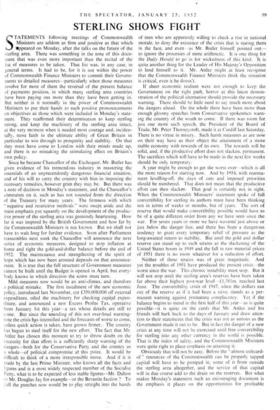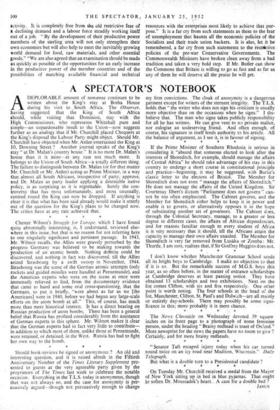STERLING SHOWS FIGHT
STATEMENTS following meetings of Commonwealth Ministers area seldom as firm and positive as that which- 11Oppeared on Monday, after the talks on the future of the sterling area. There was something in the tone of this docu- ment that was even more important than the recital of the list of measures to be taken. That list was, in any case, in general terms. It had to be, for it is not within the power of Commonwealth Finance Ministers to commit their Govern- ments to detailed measures—particularly when those measures involve for most of them the reversal of the present balance of payments position, in which many sterling area countries have been paying out more than they have been getting in. But neither is it normally in the power of Commonwealth Ministers to put their hands to such positive pronouncements on objectives as those which were included in Monday's state- ment. They reaffirmed their determination to keep sterling strong, and keep the machinery of the sterling area intact, at the very moment when it needed most courage and, inciden- tally, most faith in the ultimate ability of Great Britain in particular to win through to prosperity and stability. On that they must have come to London with their minds made up, and there is no mistaking the stimulating effect on Britain's own policy.
Since he became Chancellor of the Exchequer, Mr. Butler has given evidence of his tremendous industry in mastering the essentials of an unprecendently dangerous financial situation, and of his will to carry the country with him in imposing the necessary remedies; however grim they may be. But there was a note of decision in Monday's statement, and the Chancellor's comments on it, such as has not sounded from the direction of the Treasury for many years. The firmness with which "negative and restrictive methods " were swept aside and the main emphasis put squarely on the development of the produc- tive power of the sterling area was genuinely heartening. How far it was inspired by the British Government and how far by the Commonwealth Ministers is not known. But we shall not have to wait long for further evidence. Soon after Parliament reassembles next week the Chancellor will announce the next series of economic measures, designed to stop inflation at home and right the gold-and-dollar balance before the end of 1952. The maintenance and strengthening of the spirit of hope which has now been aroused depends on that announce- ment. It is true that the full structure of Government measures cannot be built until the Budget is opened in April, but every- body knows in which direction the screw must turn..
Mild measures now would be an anti-climax, and therefore a political mistake. The first instalment of the new economic policy, introduced last November, cut £350,000,000 off external expenditure, oiled the machinery for checking capital expen- diture, and announced a new Excess Profits Tax, operative' from January 1st this year—a tax whose details are still to come. , But since the Sounding of this not over-loud warning- note the crisis hp intensified and the forecasts of worse to come, unless quick action is taken, have grown firmer.. The country has begun to steel itself for the new effort. The fact that Mr. Attlee has chosen this moment to try to throw doubt on the necessity for that effort is a sufficiently sharp warning of the dangers—both for the Conservative Party and the country as a whole—of political compromise at this point. It would be difficult to think of a more irresponsible move. And if it is made by the last Prime Minister, who knows all the facts and figures and is a most widely respected member of the Socialist Party, what is to be expected of less stable figures—Mr. Dalton or Mr. Douglas Jay for example—or the Bevanite faction ? To pull the punches now would be to play straight into the hands of men who are apparently willing to check a rise in national morale, to deny the existence of the crisis that is staring them in the face, and even—as Mr. Butler himself pointed out— to ignore the processes of mere arithmetic. It is one thing for the Daily Herald to go in for wickedness of this kind. it is quite another thing for the Leader of His Majesty's Opposition to lend himself to it. Mr. Attlee might at least recognise that the Commonwealth Finance Ministers think the situation is critical, even it he doesn't.
If sheer economic realism were not enough to keep the Government on the right path, horror at this latest demon- stration of the political alternative should provide the necessary warning. There should be little need to say much more about the dangers ahead. On the whole there have been more than enough gloomy speeches from Conservative spokesmen warn- ing the country of the wrath to come. If there was room for just one more such speech, the President of the Board of Trade, Mr. Peter Thorneycroft, made it at Cardiff last Saturday. There is no virtue in misery. Such harsh measures as are now on their way have as their object the attainment of a more stable economy with rewards of its own. The rewards will be solid, and, if the productive effort does not slacken, permanent. The sacrifices which will have to be made in the next few weeks should be only temporary.
A year might be enough to get the worst over—which is all the more reason for starting now. And by 1954, with rearma- ment levelling-off, the days of cuts and imposed priorities should be numbered. That does not mean that the productive effort can then slacken. That goal is certainly not in sight. When the Commonwealth Ministers' statement spoke of full convertibility for sterling its authors must have been thinking not in terms of weeks or months, but of years. The sort of reserve that would make convertibility possible would have to be of a quite different order from any we have seen since the war. For seven years or more we have wavered just above or just below the danger line, and there has been a dangerous tendency to greet every temporary relief of pressure as the long-awaited return to stability. But until the gold and dollar reserve can stand up to such strains as the slackening of the United States boom in 1949 and the fall in raw material prices of 1951 there is no room whatever for a reduction of effort.
Neither of these strains was of great magnitude. And yet the troubles of 1951 have produced the present crisis—the worst since the war. This chronic instability must stop. But it will not stop until the sterling area's reserves have been taken far above their highest post-war level—£1,381m. reached last June. The convertibility crisis of 1947, when the dollars ran out of the reserve as if it had been a sieve, stands as a per- manent warning against premature complacency. Yet if the balance begins to mend in the first half of this year—as is quite possible—it is quite on the cards that Mr. Attlee and his friends will hark back to the days of January and draw atten- tion to their statements that the crisis was not as serious as the Government made it out to be. But in fact the danger of a new crisis at any time will not be exorcised until free convertibility for sterling into any other currency in the world is possible. That is the index of safety, and the Commonwealth Ministers were quite right to place emphasis on attaining it.
Obviously that will not be easy. Before the " almost unheard- of " resources of the Commonwealth can be properly tapped capital will have to be pumped in, some of it from outside the sterling area altogether, and the service of that capital will in due course add to the drain on the reserves. But what makes Monday's statement such an encouraging document is the emphasis it places on the opportunities for profitable activity. It is completely free from the old restrictive fear of a declining demand and a labour force steadily working itself out of a job. "By the development of their productive power members of the sterling area will not only strengthen their own economies but will also help to meet the inevitably growing world demand for food, raw materials, and other essential goods." "We are also agreed that an examination should be made as quickly as possible of the opportunities for an early increase in the productive power of the member countries and of the possibilities of matching available financial and technical resources with the enterprises most likely- to achieve that pur- pose." It is a far cry from such statements as these to the fear of unemployment that haunts all the economic policies of the Socialists and their trade union backers. It is also, let it be remembered, a far cry from such statements to the restrictive policies of the pre-war Conservative Governments. The Commonwealth Ministers have broken clean away from a bad tradition and taken a very bold step. If Mr. Butler can show the Commons that Britain is willing to go as fast and as far as any of them he will deserve all the praise he will get.



































 Previous page
Previous page